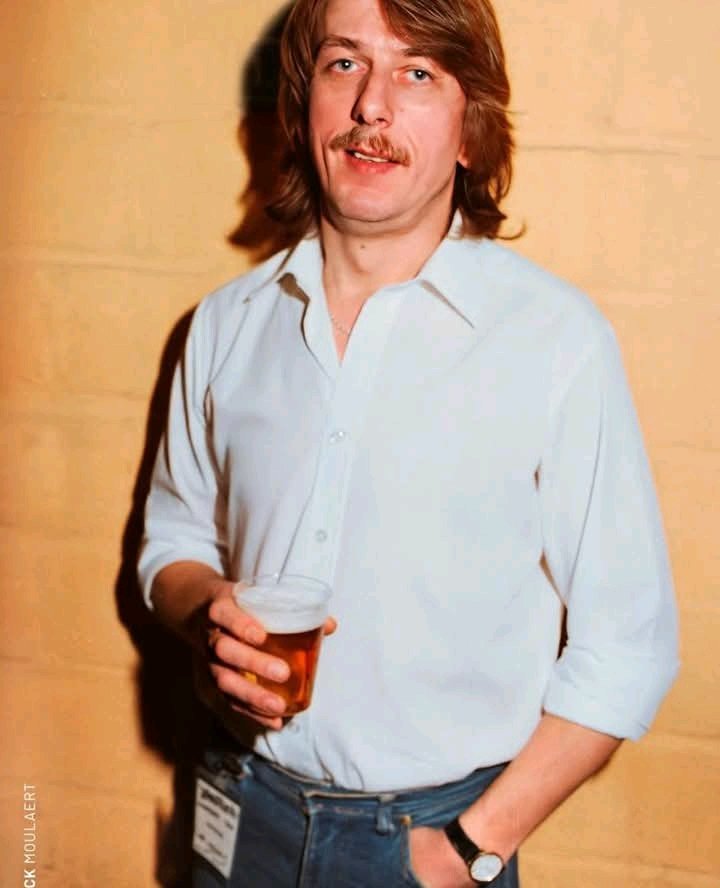Dave Holland died 6 years ago today. Dave was the drummer during Judas Priest’s glory period from 1979 to 1989. Here’s a photo of him after show taken in Brussels on Jan 28th 1984….
Remembering Dave Holland: Six Years Since the Beat Stopped….
July 6, 2025 — Today marks six years since the passing of Dave Holland, the drummer whose steady, thunderous rhythms helped define one of the most iconic eras in heavy metal history. As fans reflect on his legacy, his contributions to Judas Priest and the genre at large stand as a testament to his undeniable skill behind the kit and the complex legacy he left behind.
### The Man Behind the Kit
Born on April 5, 1948, in Northampton, England, Dave Holland began his musical career in the 1960s, honing his skills in the progressive rock and jazz fusion scenes. Before Judas Priest, Holland had already built a respectable résumé with acts like Finders Keepers and more notably, the British hard rock band Trapeze, where he played alongside future Deep Purple bassist/vocalist Glenn Hughes.
But it was his decade-long tenure with Judas Priest that would solidify Holland’s name in heavy metal history. Joining the band in 1979, Holland replaced drummer Les Binks and helped usher in what many fans and critics consider the “golden era” of Judas Priest.
### A Decade of Metal Milestones
From **1979 to 1989**, Dave Holland recorded six studio albums with Judas Priest — each one a stone-cold classic in the genre. These albums weren’t just commercially successful; they helped shape the sound and identity of heavy metal in the 1980s:
* **“British Steel” (1980)** — Featuring metal anthems like “Breaking the Law” and “Living After Midnight,” this album was a breakthrough moment for the band and for Holland’s drumming, which was precise, punchy, and powerful.
* **“Point of Entry” (1981)** — With tracks like “Heading Out to the Highway,” Holland helped the band balance radio-friendly appeal with their heavy roots.
* **“Screaming for Vengeance” (1982)** — Often cited as one of the greatest metal albums of all time, the record saw the band reach international superstardom, powered by Holland’s relentless double-bass work on “The Hellion” and “Electric Eye.”
* **“Defenders of the Faith” (1984)** — A fan-favorite album that delivered classic cuts like “Freewheel Burning” and “Love Bites,” featuring some of Holland’s most intense drumming.
* **“Turbo” (1986)** — While controversial for its synth-heavy sound, Holland’s consistency behind the kit helped anchor the band as they experimented with new styles.
* **“Ram It Down” (1988)** — Holland’s final studio album with the band marked a return to heavier roots, with tracks like “Heavy Metal” showing off his durable, heavy-handed style.
### Capturing the Glory: Brussels, 1984
One particular snapshot of Holland’s glory days remains etched in the memory of many fans — a photo taken backstage after a Judas Priest show in **Brussels on January 28, 1984**. The band was riding high on the success of *Defenders of the Faith*, and Holland, clad in leather and surrounded by the buzz of a sold-out European tour, looked every bit the metal icon. That night symbolized an era when Priest ruled arenas, their sound sharper than ever, with Holland’s drums as the relentless engine behind it all.
### A Complicated Legacy
Despite his professional achievements, Dave Holland’s life after Judas Priest was marred by controversy. In 2004, he was convicted of attempted indecent assault, a charge he denied until his death. He served time in prison, and his reputation, especially among fans, took a devastating hit. Holland remained largely out of the public eye after his release.
He passed away on **January 16, 2018**, at the age of 69, in Lugo, Spain, where he had been quietly living in the countryside. His death marked a complicated coda to a life that had seen both towering triumphs and painful disgrace.
### Remembering the Music
While Dave Holland’s personal life remains a subject of difficult discussion, his musical legacy — particularly during his time with Judas Priest — remains impactful. His drumming wasn’t flashy, but it was solid, industrial, and unshakeable — the kind of playing that made metal anthems soar and stadiums shake.
To this day, when fans crank up **“Breaking the Law,” “Electric Eye,” or “Freewheel Burning,”** they’re hearing the heartbeat of a band in its prime — and that heartbeat was Dave Holland.
Six years on, as metal fans and musicians continue to honor the sounds that shaped the genre, Dave Holland’s contributions — both celebrated and controversial — remain part of the tapestry of heavy metal history.
—
*Rest in peace, Dave Holland. April 5, 1948 – January 16, 2018.*
